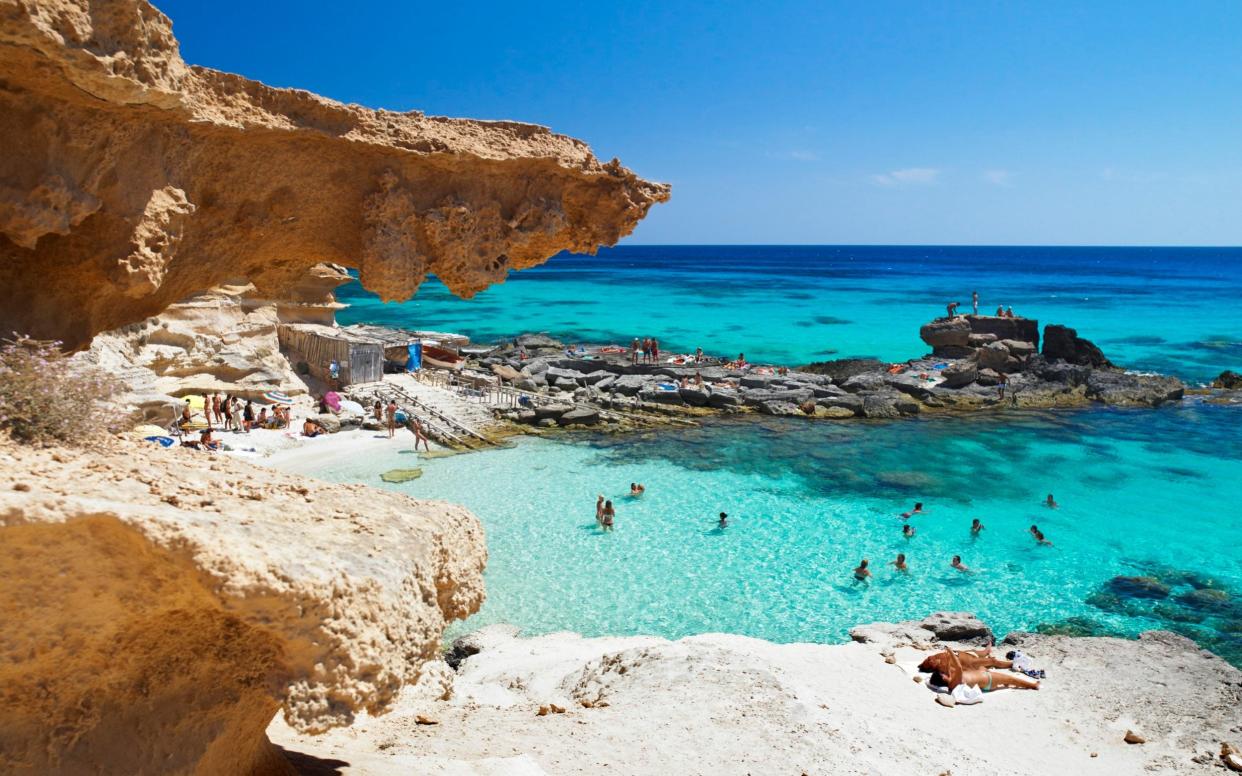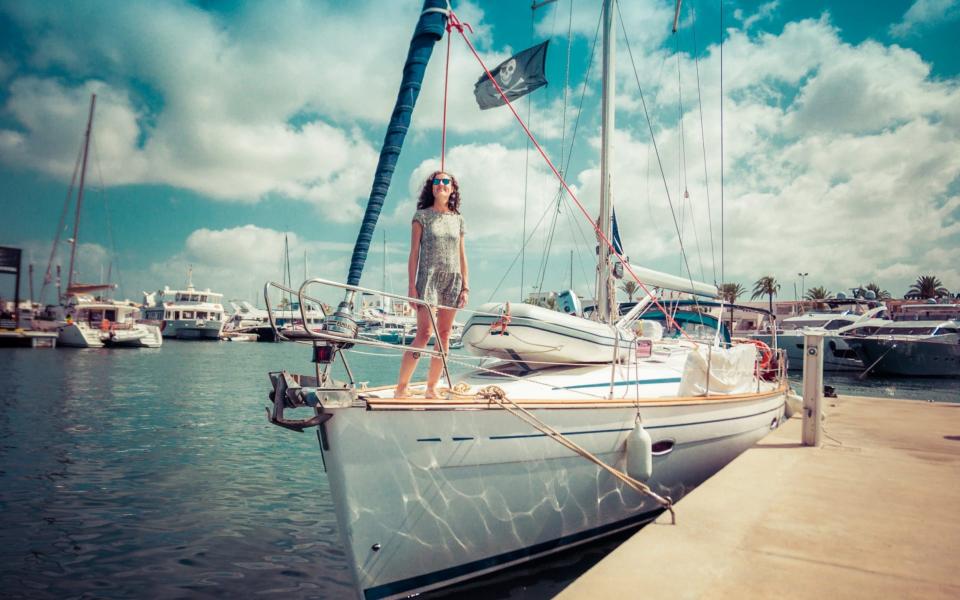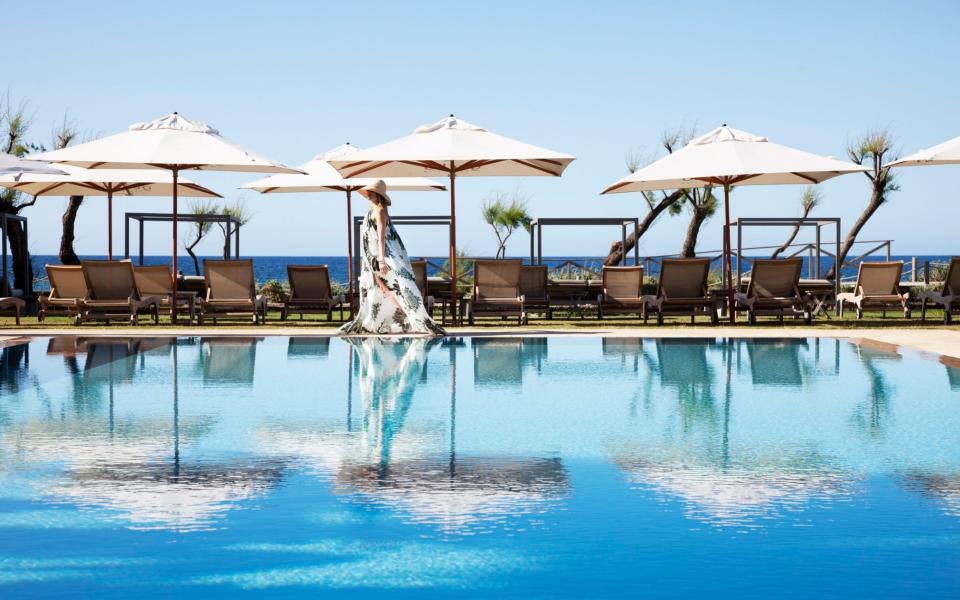Forget Ibiza – here's why bohemian Formentera is the better option for summer

Houses iced in whitewash guard a pale shoreline
Cornered by the cactus and the pine
Here I wander where sweet sage and strange herbs grow
Down a sun-baked crumpled stony road
British prog rockers King Crimson wrote Formentera Lady in 1971, but little has changed on the most untouched of the Balearics, a salt-whipped hinterland of plunging cliffs, vast underwater caves and a network of salt pans that dates back to the island’s tenure as a Roman stronghold. Formentera is famous for its beaches – improbably luminous slips of sand peppered with seafood restaurants – and has long been the day trip of choice for boats moored in neighbouring Ibiza.
The yachts arrive late in the morning, bobbing like seagulls off the shores of ice-white Playa Illetes. Guests frolic among the protected posidonia seagrass before zipping ashore to eat spiny lobster and salt-baked sea bass at Juan y Andrea or Es Moli de Sal. By sunset they have gone, leaving the island’s overnight scene to a lower-key crowd.
When we lived in Ibiza’s old port, my husband and I would take glorious little last-minute Friday night ferry trips to Formentera, holing up in sandy beach bungalows or retro resort hotels with bars that played Phil Collins. By night we would whizz across the island on our scooter, chasing shooting stars all the way to Macondo, the gloriously lo-fi roadside pizzeria that is named after the fictional town in Gabriel García Márquez’s surreal novel One Hundred Years of Solitude. We always felt like the only ones, left high and dry after the day-trippers from Ibiza had departed.
Then one year we got trapped on Formentera by a ferocious late September storm. All the ferries were cancelled as the green-grey breakers hurled themselves over La Savina’s harbour wall. An indefinite stay stretched out ahead of us. I’ve never felt so alive.
In the years before the pandemic hit everything changed, as a raft of design-driven boltholes have put a new spin on the formerly sleepy hotel scene. The centre of this new wave is Can7, the recently opened retreat, artist’s residence and (in their words) “a meeting place for our global family of explorers, dreamers and open-minded thinkers to exist in harmony with the raw elements”.

In layman’s terms, this translates as a homespun Morocco-meets-Mexico enclave whose vibe is unabashedly haute hippy. On the site of the former Las Banderas, Leah Tilbury’s mythic, anything-goes noughties hangout, Can7 is tucked discreetly among the dunes, hidden by swishing clumps of wiry blue-grey grass. Those who have been to Mykonos’s Scorpios will recognise the look – all burnt umber Bedouin tents, flickering fire pits and a Gladiator-esque desert-encampment aesthetic that fits neatly with Can7’s location close to Cap de Barbaria, the jumping-off spot between Spain and North Africa, some 160 miles south.
But just a pretty face this is not. The Can7 crew has serious provenance, being behind Ibiza’s admirably sustainable yet impossibly hip farm retreat La Granja. The ethos here is much the same. Meals are vegan and eaten at sharing tables alongside an honesty bar stashed with organic wine. There is a loose programme of rituals, from sunrise yoga to cacao ceremonies, and the hotel’s creative credentials are no joke – from candle making to sound meditation, this is a place to absorb and learn.
Guests tend to be friends of friends, so expect to see artists, actors and plenty of musicians taking a break from Ibiza to play unplugged sets on the beach. Alexea Grech, the travel entrepreneur and co-founder of Hotique, was integral in the launching of Can7.
“The concept of travel is changing fast and Formentera just feels right. It’s about barefoot luxury, walking on the sand and swimming in the blue sea. It’s about waking up in nature, meeting the locals and giving back to the community. The raw experience.”
If Can7 is raw immersion, then Gecko Hotel and Beach Club, a couple of miles along the sand, is polished to perfection. Gecko isn’t new – it has long been the glossy overnight spot for those in the know – but the hotel’s most recent revamp has left it in better shape than ever. From the mosaic-tiled lobby to the sun-dappled dining terrace, the hotel’s breezy blue-and-white aesthetic is as fresh as iced tea. Children splash in the vast swimming pool while lovers doze on canopied daybeds. Smart Spanish families eat lobster linguine beneath creamy linen sunshades, and there is a coconut milk ceviche that deserves to be famous. Under the watchful eye of Pablo Carrington (of Cap Rocat hotel, in Torralbenc), Gecko is a slick operation.
But just moments away from the beach, Formentera’s beauty becomes the primitive kind – low-slung stone walls, dusty tracks and flat, hazy fields where sheep shelter beneath giant fig trees. Even the houses are sun-baked. They sit like angular pencil scrawls on the horizon, white squares flickering against a sea of blue, like boxes not yet coloured in.

It’s this barren inland beauty that I fell in love with all those years ago. Where the road shimmers like mercury on the horizon and it’s so hot you can barely breathe. Tucked in among the prickly pears and the driftwood fences, Can Tres offers the chicest respite from the relentless heat. This trio of architect designed boltholes – Can Terra (Earth), Can Mar (Sea) and Can Aire (Air) – is split into individual apartments. Interiors by Paty Pombo are a colourful, super-textured take on modern bohemian, with Pierre Jeanneret-style woven chairs, bright Moroccan rugs and antique brass fixtures that contrast with the pared-back polished concrete walls and floors.
The vibe is laid-back and grown-up, with guests left to their own devices. This might involve a dip in the pool, a breezy bike ride or a stroll down to Kiosko 62, the barely-there chiringuito that is a throwback to the 1960s, when the arrival of the hippies left a bohemian imprint upon the island that defines it to this day. Kiosko 62 thrums with scooter-riding Italians, long haired old-timers and that rarefied coterie of global nomads who chase an endless summer between Marrakech, Tulum and Nevada’s Burning Man festival. It’s where you might spot Marni’s Consuelo Castiglioni, whose house is nearby, or the artist and actor Jemma Powell, who discovered Formentera with her husband, the singer Jack Savoretti, 15 years ago and is pulled back each year by its “ley lines, magic and enchantment”.
On their next trip, these modern-day hippies might stay at Casa Pacha Formentera, a 12-room beach retreat from Ibiza’s Pacha Group that is all white-on-white communal spaces and curated wellness gatherings. Or perhaps at Etosoto, a hilltop eco-finca with fasting programmes and moonlit yoga sessions. What is for certain is that Formentera’s overnight secret is now firmly out in the open.
The details
Fly to Ibiza, then take a ferry from Eivissa Harbour to Formentera (trasmapi.com). Opening dates for 2021 are yet to be confirmed. Where no prices are given, please call or contact through the website.
Can7 (0034 669 701 228). Can Tres (cantresformentera.com). Casa Pacha Formentera (casaformentera.com); doubles from €170. B&B Etosoto (etosoto.com). Gecko Hotel and Beach Club (geckobeachclub.com); day passes from €30.
Read more: A complete guide to the best hotels in Formentera
Overseas holidays are currently subject to restrictions.

